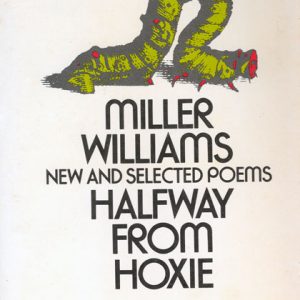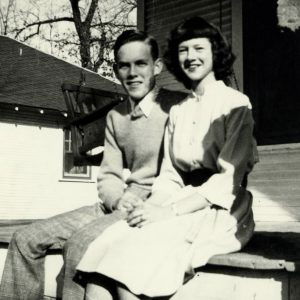calsfoundation@cals.org
Miller Williams (1930–2015)
aka: Stanley Miller Williams
Stanley Miller Williams, known professionally as Miller Williams, was one of the foremost American poets of the post–World War II era. For thirty-three years, he was a professor of English, foreign languages, and comparative literature at the University of Arkansas (UA) in Fayetteville (Washington County) and was a key figure in the university’s nationally known programs in creative writing and translation. He was the author, editor, or translator of over thirty volumes of poetry, literary criticism, and fiction.
Miller Williams was born on April 8, 1930, in Hoxie (Lawrence County) to Ernest Burdette and Ann Jeanette Miller Williams. In his early years, he lived in five Arkansas towns, where his father served as a Methodist minister. After graduating from high school in Fort Smith (Sebastian County) in 1947, he entered Hendrix College in Conway (Faulkner County), then transferred across town to Arkansas State Teachers College (now University of Central Arkansas) and later to Arkansas State College (now Arkansas State University) in Jonesboro (Craighead County), where he published his first collection of poems, Et Cetera (1952). Two years after earning a bachelor’s degree in biology in 1951 from Arkansas State College, he received a master’s in zoology at UA. For the next decade, he taught biology in several small schools, including Millsaps College in Mississippi. While at Millsaps, he returned briefly to his scientific studies at the University of Mississippi School of Medicine.
In 1951, Williams married Lucille Day. They had two daughters and a son. They divorced, and he married Rebecca Jordan Hall in 1969. His daughter Lucinda Williams is a nationally known singer and songwriter.
In 1962, with writer Flannery O’Connor’s help, he got a job in Louisiana State University’s English Department. Four years later, he joined the faculty of Loyola University in New Orleans, Louisiana, where he founded and edited The New Orleans Review. In 1970, he returned to UA as a member of the English Department and the graduate program in creative writing.
The awards and honors he received beginning in the 1950s attested to his growing stature in the literary world. Among these were: the Henry Bellman Award (1957); Breadloaf Writers Conference Fellowship in Poetry (1961); Harvard University’s Amy Lowell Traveling Fellowship in Poetry (1963–1964); New York Arts Fund Award (1970); Fulbright Professorship, National University of Mexico (1970); Prix de Rome for Literature (1976); Poets’ Prize for his poetry book Living on the Surface (1991); Charity Randall Citation for Contribution to Poetry as a Spoken Art (1993); John William Corrington Award for Literary Excellence (1994); and the National Arts Award (1997). Among his many collections of poetry are Halfway from Hoxie (1973), Living on the Surface (1989), Some Jazz a While (1999), and Time and the Tilting Earth (2009).
At the State Department’s invitation, Williams delivered lectures and readings on tours through several continents while mentoring UA students. President Bill Clinton selected him to read his poem “Of History and Hope” at his 1997 inauguration. Williams helped found the University of Arkansas Press in 1980, directing it for almost twenty years. It provided him an opportunity to publish books on the state and region that he loved and knew so well.
Williams described himself as a product of the rural, small-town environment of the South. Also important in shaping his poetry was his long engagement in science. “My poems have taken much of their substance from the gristle and thew of the sciences,” he said. Lauded for a diverse imagination and his use of irony, subtlety, and ambiguity, Williams cherished a journalist’s description of him as “the Hank Williams of American poetry.”
Williams received the Porter Prize’s Lifetime Achievement Award in 2009. Each year, the University of Arkansas Press awards the Miller Williams Poetry Prize.
Williams, who suffered from Alzheimer’s, died on January 1, 2015, in Fayetteville.
For additional information:
Baker, David. “To Advantage Dressed: Miller Williams among the Naked Poets.” Southern Review 26 (Autumn 1990): 814–831.
Beggs, Marck L. “Miller Williams & the Reader’s Poem.” Arkansas Review: A Journal of Delta Studies 50 (August 2019): 107–111.
Burns, Michael, ed. Miller Williams and the Poetry of the Particular. Columbia: University of Missouri Press, 1991.
Crowder, Ashby Bland. “Miller Williams, Poet and Teacher.” Mississippi Quarterly 67 (Fall 2014): 521–531.
Leveritt, Mara. “Lines from the Heart.” Arkansas Times, September 10, 1992, pp. 18–22.
Martin, Philip. “Miller Williams’ Pyramid.” Arkansas Democrat-Gazette, January 11, 2015, pp. 1E, 6E.
———. “The Value of Verse.” Arkansas Democrat-Gazette, November 7, 2006, pp. 1E, 6E.
Meazle, Jackson. “Poet Interview: Miller Williams.” Oxford American, March 5, 2013.
Miller Williams Biography. Poetry Foundation. http://www.poetryfoundation.org/bio/miller-williams (accessed April 8, 2020).
Miller Williams Collection. Special Collections. University of Arkansas Libraries, Fayetteville.
Riggs, Thomas, ed. Contemporary Poets. 6th ed. Detroit: St. James Press, 1996.
Robertson, Campbell. “Miller Williams, Plain-Spoken Arkansas Poet, Dies at 84.” New York Times, January 2, 2015. Online at http://www.nytimes.com/2015/01/03/arts/miller-williams-laconic-arkansas-poet-dies-at-84.html?_r=0 (accessed September 16, 2020).
Simpson, Ethel C. “Miller Williams and the University of Arkansas Press.” Arkansas Libraries 43 (March 1986): 40–45.
Turco, Lewis. “Miller Williams.” Hollins Critic 26 (April 1989): 1–9.
Willard B. Gatewood
University of Arkansas at Fayetteville











Comments
No comments on this entry yet.